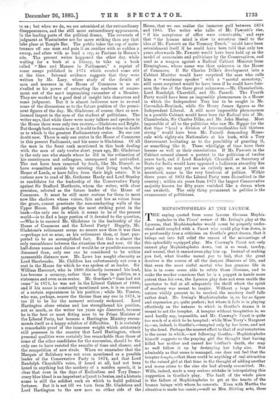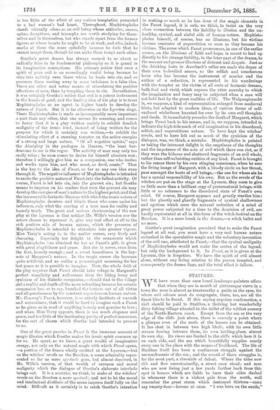MEPHISTOPHELES AT THE LYCEUM.
THE saying quoted from some famous German Mephis- topheles in the Times' review of Mr. Irving'e play at the Lyceum, that Mephistopheles would never be properly under- stood until coupled with a Faust who could play him down, is so profoundly true a criticism on Goethe's great drama, that it brings out into full relief the reason of the miscarriage of this splendidly equipped play. Mr. Conway's Faust not only cannot play Mephistopheles down, but is so weak, tawdry, and unreal, that it cannot even play him up. Instead of making you feel, what Goethe meant you to feel, that the great deceiver is the source of all the deepest illusions of life, and that even the most sinful mortal who has genuine life in him is in some sense able to refute those illusions, and to make the mocker conscious that he is a puppet in hands more potent than his own, the Lyceum play does not even enable the spectator to feel at all adequately the thrill which the spirit of mockery was meant to inspire. Without a large human nature visibly present to be mocked, the mockery itself falls rather dead. Mr. Irving's Mephistopheles is, so far as figure and expression go, quite perfect; but where it fails is in playing effectively on the natures to which in Goethe's drama it is meant to act the tempter. A tempter without temptation is, we need hardly say, impossible, and Mr. Conway's Faust is quite too much of a stick to be tempted ; while Miss Terry's Margaret is,—as, indeed, is Goethe's,—tempted only by her lover, and not by the fiend. Perhaps the nearest effect to that of real temptation is the scene in which,—not following Goethe,—Mephistopheles himself suggests to the praying girl the thought that having killed her mother and caused her brother's death, she may as well follow it up by destroying her baby also. Bat admirably as that scene is managed, one does not feel that the tempter tempts,—that there could be anything of real attraction to the ruined girl at that time in the thought of adding another and worse crime to the sins she had already committed. Mr. Wills, indeed, made a very serious mistake in interpolating this suggestion in Goethe's play. The fault of the whole piece is the failure of Mephistopheles to get at the hearts of the human beings with whom he consorts. Even with Martha the situation is made too comic ;—well as Mrs. Stirling acts, there
is too little of the effect of any serious temptation presented to a bad woman's bad heart. Throughout, Mephistopheles stands virtually alone as an evil being whose attitudes, sneers, spites, deceptions, and triumphs are worth studying for them- selves and in themselves, but who stands apart from the human figures at whose hearts he ought to be at work, and who, indeed, mocks at them the more spitefully because he feels that he cannot tempt them, though he can make them tempt each other.
Goethe's great drama has always seemed to us about as radically false in its fundamental philosophy as it is grand in its imaginative conceptions. His primary notion that even a spirit of pure evil is an exceedingly useful being because he stirs into activity even those whom he leads into sin, and so prevents them rusting away in mere indolence is a false idea. There are other and better means of stimulating the positive affections of men, than by tempting them to sin. Nevertheless, it was certainly Goethe's notion that evil is a potent instrument in the hands of good, and the leading idea of his play is to treat Mephistopheles as an agent in higher hands to develop the nature of Faust. But it is far otherwise on the Lyceum stage. There Mephistopheles is made so incomparably more important a part than any other, that one misses its meaning, and comes to fancy that it is a play written mainly to exhibit fiendish malignity of the ironic kind, instead of being written for the purpose for which it certainly was written,—to exhibit the stimulating effect of a sneering tempter on the active energies of a strong and large nature. "Of all negative spirits," says the Almighty in the prologue in Heaven, "the least bur- densome to me is the rogue. The activity of man may only too easily relax ; he soon comes to desire for himself absolute rest; therefore I willingly give him as a companion, one who incites and works upon him, and who must, as devil, create." That is the key to the idea of Faust, so far as any one idea runs throughit. The negative influence of Mephistopheles is intended to excite the positive nature of Faust into the fullest activity. Of course, Faust is led into sin, into the gravest sin ; but Goethe means to impress on his readers that even the gravest sin may develop the energies of man's nature to the highest point, and that the innumerable fantastic illusions with which the ironic nature of Mephistopheles deceives and blinds those who come under his influence, only whet the craving of a true man for reality and homely truth. The great and serious shortcoming of the new play at the Lyceum is that neither Mr. Wills's version nor the actors chosen to represent it, give any real effect at all to the rich positive side of human nature, which the presence of Mephistopheles is intended to stimulate into greater vigour. Miss Terry's acting is, in the earlier scenes, very lively and charming. Especially her delight in the ornaments which Mephistopheles has obtained for her as Faust's gift, is given with great playfulness and grace. But she is never, even from the first, homely enough ; and a sweet homeliness is the key- note of Margaret's nature. In the tragic scenes she becomes quite artificial, and as unlike a peasant-girl mourning for her lost peace as it is possible to imagine. Now, the whole drift of the play requires that Faust should take refuge in Margaret's perfect simplicity and artlessness from the biting irony and cynicism of his diabolic companion,—should find in the village girl a reality and depth all the more refreshing because his satanic companion has, so to say, knocked the bottom out of all virtue and all genuineness by his constant aspersions on human nature. Mr. Conway's Faust, however, is so utterly destitute of warmth and naturalness, that it would be hard to imagine such a Faust as he gives us in need of anything homely and genuine to love ; and when Miss Terry appears, there is too much elegance and grace, and tco little of the fascinating purity of perfect innocence, for the sort of charm which Goethe had intended to present to us.
One of the great puzzles in Faust is the immense amount of magic illusion which Goethe makes his ironic spirit summon up for us. He spent, as we know, a great wealth of imaginative energy, not only on the natural magic with which Faust opens, —a. portion of the drama wholly omitted at the Lyceum,—but on the witches' revels on the Brocken, a scene admirably repre- sented so far as mere spectacle goes, but almost deprived, in Mr. Wills's version, of that wealth of sarcasm and moral malignity which the dialogue of Goethe's elaborate interlude brings out. It is a mistake, we think, to make of the witches' revels on the Brocken a, mere spectacle, and not to let the moral and intellectual diablerie of the scene impress itself fully on the mind. Difficult as it certainly is to catch Goethe's intention
in making so much as he has done of the magic elements in the Faust legend, it is safe, we think, to insist on the very close connection between the liability to illusion and the un- healthy, cynical, and sinful side of human nature. Mephisto- pheles himself, of course, has no illusions, but his victims become creatures of superstition so soon as they become his victims. The curse which Faust pronounces, in one of the earlier scenes, on the illusions of faith and hope, is meant to lead up directly to his strange liability, in the later part of the drama, to the meaner and grosser illusions of distrust and despair. Just as the drinking louts in Auerbach's cellar are made the dupes of their own bedevilled senses, so the selfish and treacherous lover who has become the instrument of murder and the author of a seduction, is represented in his wanderings with the tempter as the victim of all sorts of fantastic dreams, both foul and vivid, which express the utter anarchy to which the imagination and fancy may be subjected when a man will not hold fast by the great realities of life. The Walpnrgisnacht is, we suppose, a kind of representation enlarged from medimval hints, but adapted to modern ideas, of various forms of self- enclosed wickedness haunted for ever by its own evil thoughts and deeds. It immediately precedes the death of Margaret, which brings Faust back to his senses, and is, we suppose, intended to indicate the high-tide mark of evil imagination in his disordered, selfish, and superstitions nature. To have kept the witches' revels, and to have left out so much of the cynicism of the dialogue, was, we think, a mistake. Mephistopheles is painted as taking the intensest delight in the emptiness of the thoughts and the impotence of the acts of evil which there run riot, as if they were the hideous and shattered fragments of an evil whole, rather than self-subsisting entities of any kind. Faust is brought to his senses there by his own stinging conscience, when he sees the living image of Margaret, with a bloody circle on her throat, pass amongst the hosts at evil beings,—the one for whose sin he has a special responsibility of his own. But as the revels of the witches are put on the stage at the Lyceum, they seem to give us little more than a brilliant orgy of preternatural beings, with little or no reference to the disordered state of Faust's own mind. Of course, Margaret appears and greatly startles him; but the ghostly and ghastly fragments of cynical shallowness and egotism which seem the natural reflection of a mind of great power subjected for a time to the dominion of evil, are hardly represented at all in this form of the witch festival on the Brocken. It is a mere break in the drama,—a witch ballet and no more.
Goethe's great imagination perceived that to make the Faust legend at all real, you must have a very real human nature embarked in the speculative magic and the voluntary invocation of the evil one, attributed to Faust,—that the cynical malignity of Mephistopheles would not make the centre of the legend, but only the background to it. In Faust, as it is given at the Lyceum, this is forgotten. We have the spirit of evil almost alone, without any living relation to the person tempted, and consequently the drama flags, and the total effect is failure.



































 Previous page
Previous page